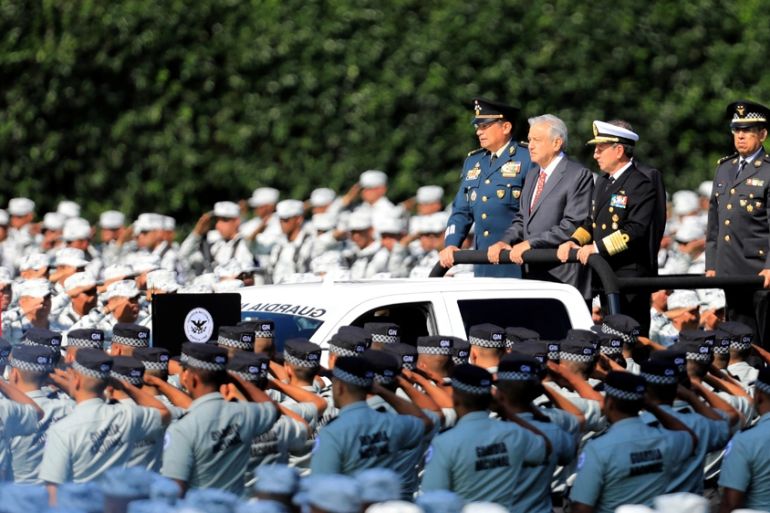Mexico cautiously boosts spending in its 2020 budget
Government allocated more funds for social welfare programmes, security and national oil firm Pemex.

Mexico‘s government cautiously freed up funds for spending in its 2020 budget proposal on Sunday, slightly loosening a primary surplus target as it aimed to balance big welfare promises with the reality of a stagnant economy.
President Andres Manuel Lopez Obrador‘s second budget since winning a landslide election victory last year aims to boost spending on social welfare programmes, security and state-run oil company Pemex, while at the same time eschewing new taxes or fuel price increases.
Keep reading
list of 4 itemsShip that caused deadly Baltimore Key bridge collapse towed to port
‘Why should we vote?’ India’s jute workers blame politicians for woes
California farmworkers cheer new housing in town scarred by mass shooting
One of the principal measures of Lopez Obrador’s commitment to fiscal responsibility is the primary fiscal surplus of 0.7 percent of gross domestic product (GDP) targeted in the budget for next year – below earlier targets.
The primary surplus is what is typically left to the government to service debt after it has accounted for income from taxes and current spending.
A preliminary budget forecast sent to legislators in April forecast a primary surplus of 1.3 percent of GDP for 2020.
“We applaud the fiscal discipline and responsibility in spending,” said Alfonso Ramirez Cuellar, chair of the budget committee in the lower house of Congress, which will evaluate the blueprint.
Alberto Ramos, head of Latin American research at Goldman Sachs in New York, had warned that the primary fiscal surplus needed to be above 0.5 percent of GDP, since going below that “would signal a weakening commitment to fiscal discipline”.
Speaking from the main dais of the lower house in front of two large, draped Mexican flags, Finance Minister Arturo Herrera said approximately 60 percent of the budget is destined for fixed spending, including payments to local governments and pensions.
“The remaining 40 percent will go to three main destinations: welfare, security and the third spot is fiscal support for Pemex,” said Herrera, who noted the budget sets aside some $4.4bn in extra funds for the ailing oil firm.
Part of the funds for security will go towards the new National Guard, a security force created by Lopez Obrador to combat spiralling violence and record homicide rates.
The National Guard has placated United States President Donald Trump by patrolling the border to stem the flow of US-bound migrants, down 56 percent between May and August, according to Mexican government figures on Friday.
Security Minister Alfonso Durazo has previously said he expects the budget to set aside 56 billion pesos ($2.87bn) for the National Guard, but that figure was not highlighted in the budget documents.
The budget blueprint calls for 59.2 billion pesos ($3.03bn) for “security and citizen safety” spending next year, approximately 6.5 percent higher than the 2019 budget.
The budget also calls for 523.4 billion pesos ($26.8bn) for state-owned oil company Pemex, up about nine percent compared with this year’s level, while Herrera stressed the 86 billion pesos ($4.4bn) in extra support for the firm, including a capital injection of 46 billion pesos ($2.35bn).
The budget blueprint estimates Pemex’s year-end 2020 oil output at 1.95 million barrels per day, but it was unclear if this includes just crude or total liquids production.
Pemex crude production has fallen for 14 consecutive years, which has also meant less tax revenue for the government.
Falling oil production and prices, as well as declining resources from income and value-added taxes as Mexico‘s economy barely escaped entering a recession, have meant lower tax revenue.
The budget blueprint forecasts 2020 economic growth of between 1.5 percent and 2.5 percent, and total government income of 6.1 trillion pesos ($312bn).
While Ramirez Cuellar expressed a mostly positive view on the budget proposal, he said the committee he leads would not be a rubber stamp.
“I think there needs to be a greater effort in income generation,” he said.